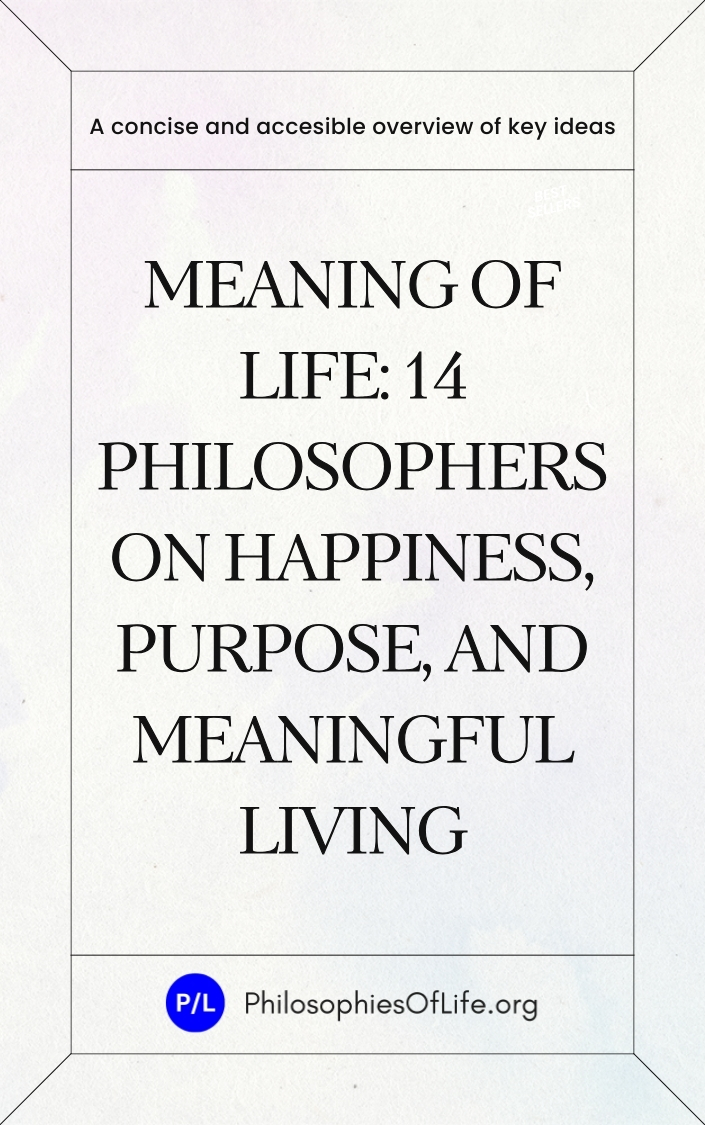A philosophy of life refers to a person’s overall outlook, principles, and beliefs guiding their actions and decisions.
If you have started to reflect on the philosophy and meaning of life, it can be difficult to know how to begin. Without a framework for organizing your thinking, you’ll likely just feel confused. In what follows, I have categorized what I take to be key themes in the philosophy of life along six dimensions. This framework can make it easier to start thinking about the philosophy of life. Beyond that, this article is structured as a series of short dialogues, open-ended questions, and reflections to prompt reflection.
Philosophical Living: Thinking, Feeling, and Doing
Philosophy is sometimes considered to be about thinking and nothing else. Many leading philosophers will tell you that when we’re being philosophical, we are essentially thinking carefully about different things that matter to human beings.
It is absolutely true that philosophy is very much about thinking. But what you don’t often hear philosophers acknowledge is that thinking can get in the way of living well. Perhaps that’s because they have forgotten or don’t understand this fundamental truth.
Thinking gets in the way of living in the condition of OCD. In one way in which OCD can appear, sometimes referred to as ‘pure’ OCD, a person suffers greatly because they ritualistically think the same thing over and over again. Thought becomes an end in itself, not a means to an end.
When thinking becomes obsessional – when we start to engage in thinking for its own sake – thinking quickly destroys our ability to live well.
“Analytic” philosophy is the name given to the kind of philosophy that dominates in the Western university philosophy departments today. It is a professionalized form of philosophy in which debates over philosophical positions unfold in scholarly trade journals. If we take a step back – as philosophers ought to do – and observe the behavior of the community of analytic philosophers, it’s reasonable to ask whether the group may have fallen into the trap of allowing thinking to get in the way of living philosophically.
Dimensions of a Philosophy of Life
The challenge for anyone pursuing philosophy is to create a balance between thinking and feeling, and between thinking and doing.
Thinking is important to philosophy, but it’s also true that thinking can get in the way of living. The challenge for anyone pursuing philosophy is to create a balance between thinking and feeling, and between thinking and doing. The six dimensions of a philosophy of life that I’m about to discuss are themes that demand our thought. But they also connect deeply with our emotional lives and with the principles we use to govern the choices and actions that define us. This is not supposed to be a technical exercise in philosophy. It is intended for those who are new to thinking about philosophy or those who have gone deep into scholarly philosophy and wish to recall what made philosophy most interesting to them when they first started out.
Theistic/Religious Dimension

Philip: Why does anything exist, when there could have been nothing at all?
Connie: I don’t know.
Philip: Well, it’s got to be true that things can’t just come into existence unless they have been caused to come into existence.
Connie: I suppose so.
Philip: The fact that something exists means that it was caused. So God must exist to have brought things into existence.
Philosophers have been fond of attempting proofs of the existence of God. One of the more ingenious routes, illustrated above, is to claim that God must exist in order to account for the fact that there is something rather than nothing. But even supposing it’s true that things can’t come into existence without a cause, we can’t immediately conclude that God exists.
- If it’s true that nothing can exist without a cause, then God itself couldn’t exist without a cause. Seemingly, there needs to be an additional God to have brought the first God into existence. You can see that this leads to having to posit one God after another, without end. If your answer to why anything exists at all is that there is an infinite series of Gods, that fails as a proof of the existence of God.
- Even if this problem were overcome and we were convinced that there was a first cause of the universe and that we should use the word “God” to name it, you still haven’t established that this “God” is anything like the God of religions – which has additional features beyond being just a “cause of things.” For instance, the God of religions is thought of as all-knowing, just, and loving.
In my opinion, attempted logical proofs of the existence of God lead nowhere. Religious people are better off talking about faith than proof.
Kierkegaard made the “leap of faith” a core principle of his religious philosophy. But what seems compelling to Kierkegaard is not compelling to others. For them, the path to an authentic philosophy of life cannot go by way of religious faith and likely leads to agnosticism or atheism.
As individuals exploring our philosophies of life, one of our first and most important tasks is to dig deeply and understand where we stand on the question of whether we are comfortable believing in God on the basis of faith alone.
This is a tough question that you will likely agonize over if you are approaching it authentically.
- Is there an intelligent, divine cause (eg. God) of the universe?
- If God exists, does it establish or create the standards for what counts as human moral behaviour?
- How does the existence of suffering and evil in the world challenge the traditional notions of an omnipotent, benevolent deity, and what implications does this have for our understanding of a God’s role in the universe?
Existential Dimension

Philip: No two people have exactly the same personality or life history. No two people have exactly the same talents, desires, or set of internal and external obstacles in pursuing their goals.
Connie: That sounds true.
Philip: When you unthinkingly try to live your life according to a pre-existing set of rules or community practices, you ignore these individual differences that make you unique. You set yourself up for living a life lacking in authenticity.
It is important to ask yourself whether you prioritize the value of individual expression ahead of or behind the value of community (or family) coherence. This is a central question because these two values can conflict. The way you respond when this happens tells us a lot about who you are.
Many people live their lives as if this question has already been answered for them and there is no need to revisit it. They may have grown up in an environment in which it is taken as a given that you should put community or family first. So if someone has a desire that isn’t in harmony with the practices of the group, that desire should be suppressed. On the other hand, people who have grown up in very liberal contexts may never have thought about benefits to life that can come from group harmony. Either way, there is a lack of questioning.
We must be extremely careful, in my view, before we allow the value of individuality to take a backseat to the value of community coherence. Community gives meaning to life. But there are limits. To achieve subtler forms of meaning in life, individuals need to be allowed to explore and express themselves as individuals. This can’t be done without exercising our individual wills, experiencing the consequences, and learning from the outcomes.
- Are self-creation and authenticity essential to living a meaningful existence?
- Could we lead a meaningful life if we just followed what others/the community deems acceptable?
- What would it mean for the human quest for meaning if God doesn’t exist and the universe is indifferent to such a quest?
Moral Dimension

Philip: Reflecting on the trolley problem forces people to explore their moral outlook on a deeper level.
Connie: What’s the trolley problem?
Philip: A runaway trolley is on course to collide five people further down the track. If this happens, they won’t survive. A bystander observing this is in a position to intervene to divert the trolley to a second track. But if he does this, it will collide with the one person who is on the second track.
Connie: What should the bystander do?
Philip: That’s the difficult moral question. Is it right to take action that causes the death of one person to save five people?
Connie: The bystander would probably feel guilty either way.
No philosophy of life can exist without a moral dimension – the dimension of right and wrong. Morality exists in human life in ways that it does not in the lives of other animals. Most of us agonize over decisions that have moral consequences. Moral principles underlie moral decision-making.
I say that “most of us” feel concerned about the moral dimension. But not everyone does. Some people believe that the only real test of whether to engage in immoral behavior that would benefit them is whether they can get away with it.
For people who find this self-centered lack of moral concern alien and perhaps even a bit scary, there are some basic fault lines that will define their concern with living morally. One of the key fault lines is between what are called “consequentialist” moral theories and “deontological” theories.
Utilitarians are a specific variety of consequentialists who believe that the point of morality is to maximize peoples’ happiness. They believe it can be morally acceptable to deliberately harm one person if the loss of that person’s happiness causes more happiness overall.
If you fall on the other side of this fault line, the deontological side, then you do not accept this. You believe that the rightness or wrongness of an act is contained within the act itself. If it is wrong to harm a person, then that wrongness doesn’t depend on whether doing so maximizes peoples’ happiness.
- Would you engage in immoral behavior that benefitted you if you were certain that no one would ever find out?
- Is it ever right to harm one person if it benefits many more people?
- If a certain kind of behaviour can be truly described as morally wrong, could it still be morally acceptable in another culture?
Happiness Dimension

Philip: What do you think it means to be happy?
Connie: I would say it means that you’re having a lot of experiences of pleasure in your life.
Philip: That’s a widely held view. But historically, philosophers have tended to resist equating happiness with pleasure.
Connie: For example?
Philip: Stoicism is a philosophical school that originated in ancient Greece. They did not believe that happiness has anything fundamentally to do with pleasure. Rather, they define happiness in terms of the way a person lives. The happy person will be living a virtuous life, which they describe as living “in agreement with nature.”
It makes sense to think that there is a close connection between happiness and pleasure. For instance, the Oxford English Dictionary defines happiness as “the state of pleasurable contentment of mind; deep pleasure in or contentment with one’s circumstances.”
But surprisingly many philosophers have rejected this commonsense view. Why?
The explanation may partly have to do with something called “reason.” Philosophers have viewed reason as a very abstract human ability that can only properly be exercised when it is decoupled from things like emotions or other bodily states, like pleasure. Reason is pure and unadulterated; these other states interfere with reason. Or at least that is what many philosophers seem to believe. (Strangely, this is even true in aesthetics as I’ve argued in my book on Kant. Kant could only allow pleasure a place in his account of aesthetic experience if it served a further aim of helping the individual to become more fully rational.)
The philosopher’s investment in reason was firmly entrenched in ancient Greek philosophy, and it has been passed down through generations of philosophers since then. My own view is that there has always been an element of fantasy in the average philosopher’s personal investment in reason.
In my interpretation of this tradition, then, a philosopher will tend to view happiness as something fundamentally tied up with the use of reason and the pursuit of a rational existence, because he or she idealizes and perhaps overvalues reason. Whereas, for most non-philosophers this way of making sense of happiness (rightly) seems odd.
- Is being happy the same thing as experiencing pleasure?
- How does the pursuit of happiness relate to the overall search for meaning in life, and can one exist without the other?
- How do cultural and societal norms shape our individual definitions of happiness and the meaning of life, and what role should personal introspection play in redefining these concepts?
Reality Dimension

Philip: Water flows in a river, which means that at any two times, it is not the same. Do you agree?
Connie: Sure.
Philip: And yet, it is also true that it, in spite of constantly changing, it is the same river over time.
Connie: I suppose that’s true, too. How can it both be true that it’s not the same river over time, and that it is the same river over time?
The world is in a constant state of flux, full of opposite states which occur at the same time. One interpretation of this idea is that contradictions are part of reality: reality at its core doesn’t obey the laws of traditional logic. On a more everyday level, we can understand this idea as connected with the fact that change and becoming are inherent features of most of the things we experience.
A philosophy of life must reckon with the ever-changing nature of reality, at all levels. From basic physical processes, to social processes like politics and trends, to the development of new technologies, to changes which we all undergo as individuals over time as our life histories unfold.
Many people, understandably, find change difficult to embrace. What we really want is to be able to live out our lives enjoying the comfort and security of things staying the same. But people who fail to acknowledge change and becoming are at risk embracing a fantasy of stability that causes them great amounts of stress and anxiety when the world does not match their fantasy.
- Are change and becoming a fundamental features of reality?
- How do universals exist independently of the individual instances in which they are manifested, and what does this imply about the nature of reality?
- How do the concepts of being and existence shape our understanding of our own identity and purpose in the universe?
Understanding Dimension

Philip: How are we as human beings able to become aware of the people and things in the world around us?
Connie: Through our senses – sight, sound, touch, taste, smell.
Philip: Exactly. Now here’s the question we need to ask ourselves. How likely is it that our senses enable us to become aware of everything there is to be aware of in the world around us?
Connie: I’m not sure.
Philip: I think it’s probably unlikely that we can become fully aware of reality through our senses. While we may be able to understand a lot about the world, especially as science and technology advances, I think that there will always be limits to our awareness of the world.
Connie: That makes sense.
Philip: Our minds may also limit what we can understand. As we take in new experiences, these get structured by our mind, which puts things into categories using concepts that we are familiar with. Just as our senses limit what aspects of the world we can become aware of, our need to use a given set of concepts in making sense of our experiences limits what we can understand about the world.
Our senses have emerged through evolutionary processes. These processes have honed our senses to be able to function and survive in the situations human beings typically face on Earth. But we can’t conclude from this that our senses are equipped to enable us to become aware of every kind of phenomenon that exists in the physical universe around us.
Instruments used in scientific investigation detect phenomena that we cannot become aware of using our unaided senses. But our instruments probably can’t detect everything there is to detect. To consider a very fundamental obstacle we face, we can only develop instruments that we can imagine. We cannot develop what lies beyond our imagination. But since there will always be limits to our imaginations, it is likely that some phenomena will lie beyond our awareness even with the aid of whatever instruments we develop.
As human beings, we sometimes arrogantly assess our abilities to understand the world. Such arrogance is misplaced. Instead, our starting point should be intellectual humility.
This is true of our capacity to understand the physical world around us, and it is also true of our understanding of everyday aspects of our lives as human beings.
For instance, you may think you know everything there is to know about your neighbor, your coworker, your partner – or even yourself. But you are limited by several things. First, you have seen relatively little of their life history and you are relatively unacquainted with their first-person experience of the world. Even in your own case, there are many events that occurred when you were young – or in the background of your experience as your life has unfolded over time – that you don’t remember. But these have exerted an influence on your worldview. Psychological research also strongly suggests that we can be unaware of our own feelings, thoughts, and motivations at any given time.
- Are there limits to what we can know about ourselves or reality?
- Can the concept of a meaningful life exist independently of external validation or acknowledgment, or is meaning inherently dependent on social and cultural contexts?
- To what extent does language shape and limit our capacity to understand complex concepts and ideas?
Conclusion
It is understandable, and maybe even beneficial to you, if you are confused by philosophy. Take time to think about your philosophy of life. If you’re interested in ideas about philosophy and the human condition, subscribe to this site to receive updates when new articles are published.

